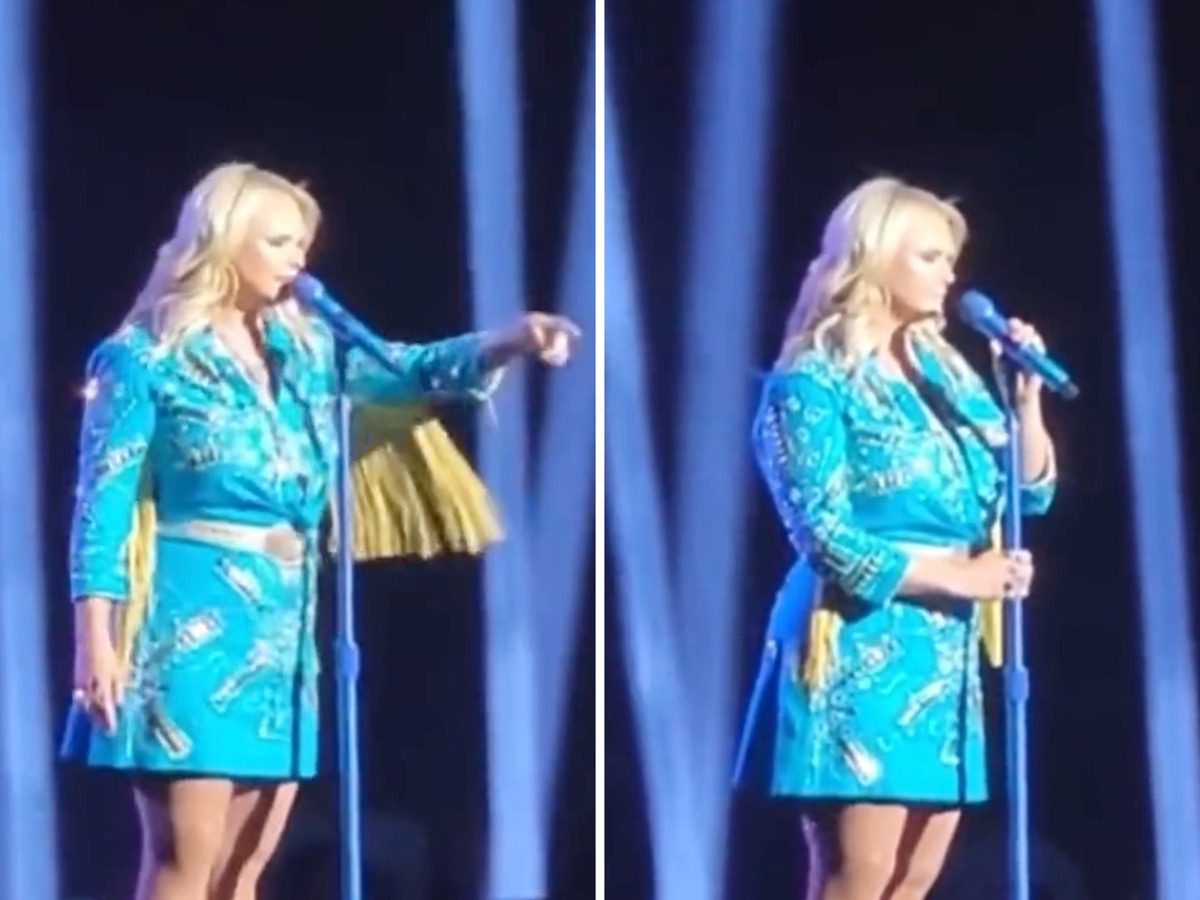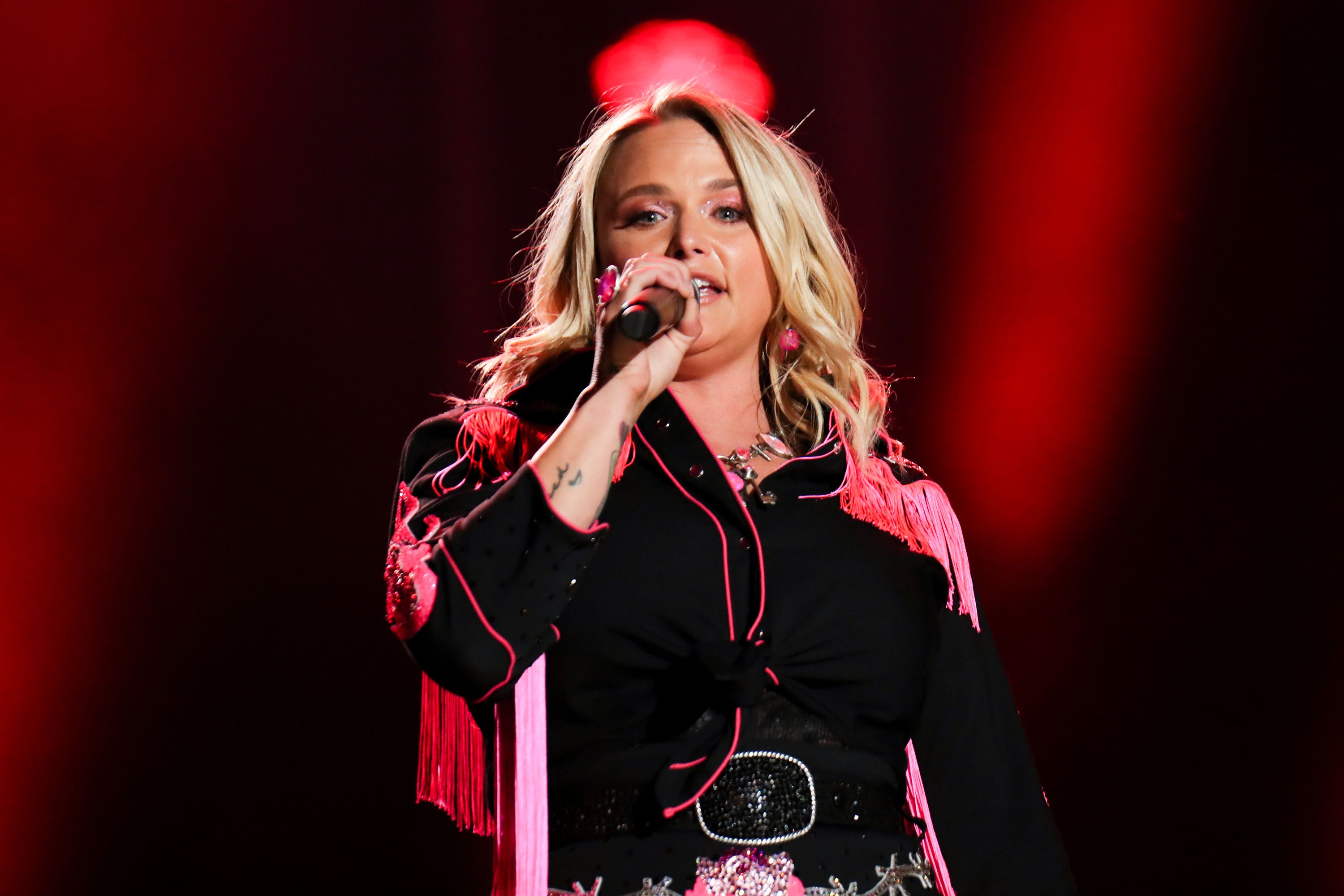Miranda Lambert Rebukes Women for Taking Selfies, Igniting Outrage: Controversial Incident Unfolds As Angry Fans Leave The Concert
Miranda Lambert expressed her concern to her fans, stating, “These girls are worried about their selfie and not listening to the song.”

Country music star Miranda Lambert faced backlash from fans after she publicly called out a group of women who were taking selfies during her concert. The incident occurred during her Las Vegas residency, where she halted her performance to address the matter.
Miranda Lambert, known for hits like “White Liar,” was in the midst of her highly-anticipated concert when she noticed a cluster of women engrossed in taking selfies. Rather than ignoring the situation, the singer decided to stop the show to directly confront the group.
The interruption caught the attention of the audience and sparked a heated discussion both at the concert and across social media. Many fans expressed their disappointment with Lambert’s actions, criticizing her for singling out the women publicly.
It is not uncommon for fans attending concerts to capture moments on their smartphones, including selfies with their favorite artists in the background. This practice has become a part of the modern concert experience, allowing attendees to immortalize their memories and share them with others.
However, Lambert’s reaction to the situation brought the debate surrounding concert etiquette to the forefront. Some fans argued that the women taking selfies were simply enjoying the moment and should not have been shamed publicly for their actions.
On the other hand, there were those who supported Lambert’s decision to address the issue, stating that such behavior can be distracting and disrespectful to both the performer and other concertgoers.
The incident highlighted the challenges faced by artists in the digital age, where technology allows instant sharing of concert experiences through social media platforms. While some artists encourage fan engagement and appreciate the exposure, others may feel that it hinders the intimacy and connection between the performer and the audience.
As the debate continued to gain momentum, Lambert’s Las Vegas residency became a focal point of discussions surrounding concert etiquette and the evolving relationship between artists and their fans.
For many, attending a concert is an opportunity to escape from the pressures of daily life and immerse oneself in the music and atmosphere created by the performer. However, the increasing prevalence of smartphones and social media has altered the concert experience for both artists and fans.
In an era where technology reigns supreme, finding a balance between enjoying the moment and documenting it can be a challenge. Lambert’s encounter with the women taking selfies brought this issue into sharp focus, forcing both artists and fans to reevaluate their behavior and expectations during live performances.
As the music industry continues to evolve, artists are faced with the task of navigating the digital landscape while preserving the authenticity and intimacy of live performances. For Lambert and her fellow musicians, finding ways to connect with their audiences without compromising the concert experience remains a delicate balance.
While Lambert’s decision to call out the women taking selfies may have ignited a contentious debate, it also served as a reminder of the shared responsibility of both artists and fans in shaping the concert experience.
In the end, the incident sparked important conversations about concert etiquette, respect for performers, and the impact of technology on live performances. It underscored the need for open dialogue between artists and fans to find common ground and ensure that the magic of live music remains a cherished and unforgettable experience for all.
During her performance of “Tin Man,” 39-year-old singer Miranda Lambert faced an incident that caught her attention and led her to pause her show. A video posted on TikTok captured the moment when Lambert halted her performance to address a group of girls engrossed in taking selfies.
In the midst of singing, Lambert noticed the distraction caused by the group’s selfie-taking activities. She decided to stop the song and turned to her pianist to convey her frustration with the situation. “I’m gonna stop right here for a second, I’m sorry,” Lambert said, acknowledging the need to address the issue.
The country music star expressed her concern about the group’s behavior, stating, “These girls are worried about their selfie and not listening to the song.” Her frustration was evident as she continued, “It’s pissing me off a little bit. Sorry, I don’t like it. At all. We’re here to hear some country music tonight. I’m singing some country damn music.”
The incident brought the issue of concert etiquette into focus once again, raising discussions about the use of smartphones during live performances. Lambert’s candid response struck a chord with both fans and critics, igniting debates on social media about the appropriate behavior of concertgoers and the impact of technology on the concert experience.
For many artists, live performances are a chance to connect with their audience on a personal level and share the magic of their music. Lambert’s frustration stemmed from the perception that some attendees were more focused on capturing the moment for social media rather than immersing themselves in the live performance.
The prevalence of smartphones has transformed the way people experience concerts, allowing them to capture and share moments with their online communities instantly. While this technology offers a means for fans to relive and share their concert experiences, it also presents challenges for artists trying to maintain a connection with their audience.
Lambert’s reaction to the incident resonated with those who believe that live performances should be respected as a unique and fleeting moment in time. Many fans and artists advocate for being present in the moment, fully engaging with the music and atmosphere without distractions.

However, the incident also prompted discussions about the evolving relationship between artists and fans in the digital age. Some concertgoers argue that capturing memories through selfies and videos is an integral part of the concert experience, allowing them to relive the magic of the performance long after it ends.
As technology continues to shape the concert experience, finding a balance between engagement and distraction remains a challenge for both artists and fans. While some artists encourage audience participation and social media sharing, others prefer a more intimate and connected atmosphere during their performances.
Lambert’s candid response during her show brought attention to the shared responsibility of both artists and concertgoers in shaping the concert experience. Her frustration underscored the need for open dialogue and mutual understanding between artists and their audiences to ensure that the magic of live music remains cherished by all.
In the end, Lambert’s encounter with the selfie-taking group served as a reminder of the importance of respecting the artistry and dedication that goes into live performances. It highlighted the impact of technology on the concert experience and prompted meaningful discussions about concert etiquette and the evolving relationship between artists and their fans in the digital age.
As the music industry continues to adapt to technological advancements, finding common ground and fostering a respectful and engaging concert atmosphere will remain essential for both artists and fans alike. The incident serves as a valuable lesson in navigating the digital landscape while preserving the authenticity and magic of live music performances for generations to come.
During her performance, Miranda Lambert expressed her frustration with concert attendees who were more interested in taking selfies than listening to her music. She candidly shared her feelings, stating, “It’s pissing me off a little bit. Sorry, I don’t like it. At all. We’re here to hear some country music tonight. I’m singing some country damn music.”

Following her remarks, some fans in the audience reacted strongly to Lambert’s outburst. Audio from social media posts and other reports revealed that several angry fans stood up and left the concert as a sign of protest. One woman was heard expressing her discontent, saying, “Let’s go — you don’t do that to fans.”
The incident left a mixed response among concertgoers and sparked discussions on social media. Some supported Lambert’s stance, emphasizing the importance of respecting the artist’s performance and engaging with the music. They felt that excessive phone use during live performances detracts from the concert experience and shows a lack of appreciation for the artist’s efforts.
On the other hand, some attendees believed Lambert’s reaction was uncalled for and expressed disappointment in her response. They argued that taking selfies and capturing moments on smartphones is a common practice among concertgoers and doesn’t necessarily indicate a lack of interest in the music. For them, live concerts are about enjoying the experience and creating lasting memories through photos and videos.
The incident highlighted the evolving dynamics between artists and their audiences in the digital age. Smartphones have become an integral part of people’s lives, and concerts provide an opportunity to capture and share special moments with friends and followers on social media platforms.
For artists like Miranda Lambert, live performances are a chance to connect with fans and share their passion for music. They want concertgoers to be present and fully engaged in the music, allowing everyone to share in the magic of the moment. Excessive phone use during performances can be seen as a distraction that hinders the artist’s ability to connect with the audience.
However, fans who defend taking selfies and videos argue that these mementos allow them to relive and cherish the concert experience long after the show is over. They feel that sharing these moments on social media also serves as a way to celebrate their love for the artist and connect with other fans.
The incident at Miranda Lambert’s concert serves as a reflection of the broader conversation about concert etiquette and the use of technology in live performances. It raises questions about the balance between preserving the authenticity of the live music experience and accommodating the digital habits of modern concertgoers.
In the age of social media, artists and fans must navigate a delicate balance to ensure that the magic of live music remains intact while allowing for the modern desire to capture and share moments digitally. Finding common ground and mutual understanding between artists and their audiences is essential in shaping the concert experience for everyone involved.
As the music industry continues to evolve, open dialogue and respectful communication between artists and fans will play a crucial role in shaping the future of live performances. Ultimately, the goal is to create a concert atmosphere that allows both artists and attendees to fully embrace the power and beauty of live music while embracing the technological advancements of the digital age.
In the comment section of the TikTok video featuring Miranda Lambert’s concert incident, many users expressed their disapproval of the singer’s actions. One user shared their personal experience attending concerts with their daughter and mentioned that taking selfies together was a way to commemorate the special occasion.
Other users criticized Lambert’s response, questioning whether she would also call out people for going to the bathroom during her performances. They considered her reaction to be unwarranted and expressed their belief that, as paying attendees, they have the right to take as many pictures as they want to capture the moment.

Some users suggested that Lambert could have handled the situation differently. They believed that she could have finished her song and then made a general statement encouraging concertgoers to be more present in the moment and minimize phone use during performances.
The incident ignited a heated debate among fans and social media users, with varying opinions on concert etiquette and the use of smartphones during live shows. While some defended Lambert’s right to express her frustration, others felt that the approach she took may not have been the most appropriate or effective way to address the issue.
In the digital age, smartphones have become an integral part of people’s lives, and attending concerts offers opportunities to capture and share special moments with friends and followers on social media. Taking selfies and videos during concerts has become a common practice for many attendees who wish to preserve memories and connect with others who share their love for the artist.
On the other hand, artists like Miranda Lambert may view excessive phone use during live performances as a distraction that hinders the connection between them and their audience. For them, concerts are a chance to create a shared experience, where everyone can be fully present in the music and feel the magic of the moment without the interruption of phones.
As technology continues to shape the concert experience, finding a balance between respecting the artist’s performance and accommodating modern concertgoers’ digital habits becomes essential. Both artists and fans need to engage in open dialogues to establish common ground and foster mutual understanding.
Ultimately, the goal is to create a concert atmosphere where the magic of live music remains intact while embracing the technological advancements of the digital age. Artists may consider finding creative ways to encourage audience engagement without resorting to direct confrontations during performances.
For fans, it is crucial to be mindful of the artist’s perspective and recognize the value of being present in the moment. Balancing the desire to capture memories through photos and videos with respecting the artist’s performance can enhance the overall concert experience for everyone involved.
As the music industry evolves, constructive discussions on concert etiquette and technology’s role in live performances will continue to shape the future of concerts. Artists, fans, and concert organizers must work together to create an inclusive and enjoyable experience that preserves the authenticity of live music while embracing the opportunities presented by the digital age.


